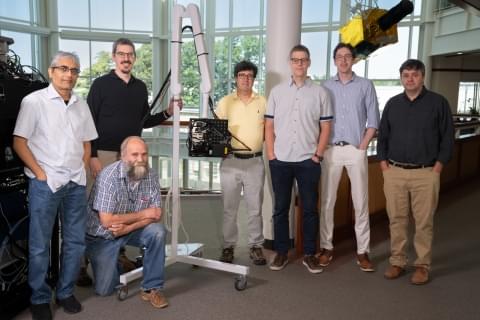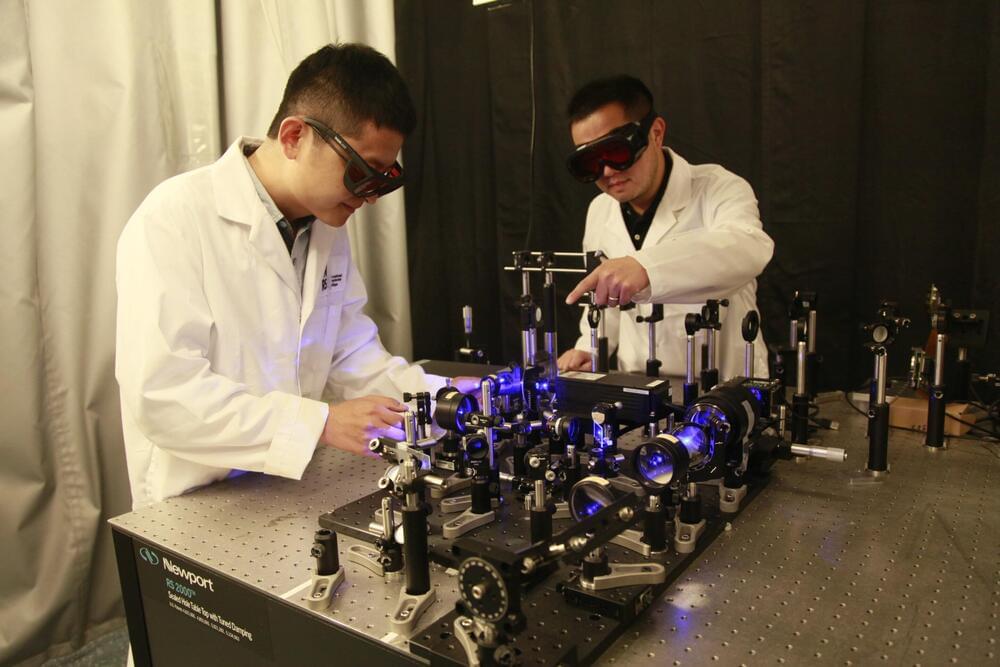Pandemic, renovation project, and rising costs create logistics nightmare for NSF-funded scientists.



🏅 R&D 100 Award Winner 🏅
The Noncontact Laser Ultrasound (NCLUS) is a portable laser-based system that acquires ultrasound images of human tissue without touching a patient. It offers capabilities comparable to those of an MRI and CT but at vastly lower cost in an automated and portable platform.
In addition to receiving an R&D 100 Award, NCLUS received the Silver Medal in the Special Recognition: Market Disruptor Products category. Congratulations to the NCLUS team!
Researchers from MIT Lincoln Laboratory and their collaborators at the Massachusetts General Hospital (MGH) Center for Ultrasound Research and Translation (CURT) have developed a new medical imaging device: the Noncontact Laser Ultrasound (NCLUS). This laser-based ultrasound system provides images of interior body features such as organs, fat, muscle, tendons, and blood vessels. The system also measures bone strength and may have the potential to track disease stages over time.
“Our patented skin-safe laser system concept seeks to transform medical ultrasound by overcoming the limitations associated with traditional contact probes,” explains principal investigator Robert Haupt, a senior staff member in Lincoln Laboratory’s Active Optical Systems Group. Haupt and senior staff member Charles Wynn are co-inventors of the technology, with assistant group leader Matthew Stowe providing technical leadership and oversight of the NCLUS program. Rajan Gurjar is the system integrator lead, with Jamie Shaw, Bert Green, Brian Boitnott (now at Stanford University), and Jake Jacobsen collaborating on optical and mechanical engineering and construction of the system.
Medical ultrasound in practice

For eons, deoxyribonucleic acid (DNA) has served as a sort of instruction manual for life, providing not just templates for a vast array of chemical structures but a means of managing their production.
In recent years engineers have explored a subtly new role for the molecule’s unique capabilities, as the basis for a biological computer. Yet in spite of the passing of 30 years since the first prototype, most DNA computers have struggled to process more than a few tailored algorithms.
A team researchers from China has now come up with a DNA integrated circuit (DIC) that’s far more general purpose. Their liquid computer’s gates can form an astonishing 100 billion circuits, showing its versatility with each capable of running its own program.
Join this channel to get access to perks:
https://www.youtube.com/channel/UCiPW7OlzTfQjR_vLlkYPZCg/join.
Join the Dr. Cellini Family: https://tinyurl.com/DrCellini.
______
CONTACT ME:
📸 Instagram — https://instagram.com/drcellini.
📹 TikTok — @DrCellini.
🐦 Twitter — https://twitter.com/dr_cellini.
📧 Email: [email protected].
———-
https://www.wearfigs.com.
———-
MY TOOLS & GEAR:
🎥 My YouTube Camera Gear — https://www.amazon.com/shop/drcellini?tag=lifeboatfound-20.
⌨️ My Keyboard — Wireless F96 KAT mechanical keyboard — http://iqunix.store/drcellini.
🎵 Where I get ALL of My Music from Epidemic Sound! — https://www.epidemicsound.com/referral/25q7o4/
My Camera: https://amzn.to/2GX4whr.
My Lens: https://amzn.to/2C7NYxt.
Camera Tripod: https://amzn.to/2LUABWf.
Memory Card: https://amzn.to/2LVjtPZ
As an Amazon Associate I earn commission with use of the above links on qualifying purchases
———-
OTHER STUFF:

Capturing blur-free images of fast movements like falling water droplets or molecular interactions requires expensive ultrafast cameras that acquire millions of images per second. In a new paper, researchers report a camera that could offer a much less expensive way to achieve ultrafast imaging for a wide range of applications such as real-time monitoring of drug delivery or high-speed lidar systems for autonomous driving.
“Our camera uses a completely new method to achieve high-speed imaging,” said Jinyang Liang from the Institut national de la recherche scientifique (INRS) in Canada. “It has an imaging speed and spatial resolution similar to commercial high-speed cameras but uses off-the-shelf components that would likely cost less than a tenth of today’s ultrafast cameras, which can start at close to $100,000.”
In a paper, titled “Diffraction-gated real-time ultrahigh-speed mapping photography” appearing in Optica, Liang together with collaborators from Concordia University in Canada and Meta Platforms Inc. show that their new diffraction-gated real-time ultrahigh-speed mapping (DRUM) camera can capture a dynamic event in a single exposure at 4.8 million frames per second. They demonstrate this capability by imaging the fast dynamics of femtosecond laser pulses interacting with liquid and laser ablation in biological samples.

This talk was given at a local TEDx event, produced independently of the TED Conferences. Stella Davies asks a powerful question: If you could save the life of a child with 2 hours of your time-would you? Her talk is inspiring and encouraging. Depending on the kindness of strangers is shown throughout this talk. We have a profound impact on what we can do for each other even if we don’t know each other. Stella was born in Liverpool, England. She came to the USA in 1989, planning to stay for a year and learn more about bone marrow transplantation. Three weeks after arrival she met her American husband and has been in the US ever since. Stella is now the director of the bone marrow transplant program at Cincinnati Children’s Hospital.
Stella Davies was born in Liverpool, England. She came to the USA in 1989, planning to stay for a year and learn more about bone marrow transplantation. Three weeks after arrival she met her American husband and has been in the US ever since. Stella is now the director of the bone marrow transplant program at Cincinnati Children’s Hospital. www.BeTheMatch.Org/join.
About TEDx, x = independently organized event In the spirit of ideas worth spreading, TEDx is a program of local, self-organized events that bring people together to share a TED-like experience. At a TEDx event, TEDTalks video and live speakers combine to spark deep discussion and connection in a small group. These local, self-organized events are branded TEDx, where x = independently organized TED event. The TED Conference provides general guidance for the TEDx program, but individual TEDx events are self-organized.* (*Subject to certain rules and regulations)


Researchers at Max Planck Institute of Quantum Optics (MPQ) and Technical University of Munich (TUM) demonstrated a potential platform for large-scale quantum computing and communication networks. Secure quantum networks are of interest to financial institutions, medical facilities, government agencies, and other organizations that handle personal data and classified information due to their much higher level of security.
To create an environment that supported quantum computing, the researchers excited individual atoms of the rare-earth metal erbium. The excitation process caused the erbium atoms to emit single photons with properties suitable for the construction of quantum networks.

By Deborah Pirchner, Frontiers science writer.
Malaria is an infectious disease claiming more than half a million lives each year. Because traditional diagnosis takes expertise and the workload is high, an international team of researchers investigated if diagnosis using a new system combining an automatic scanning microscope and AI is feasible in clinical settings. They found that the system identified malaria parasites almost as accurately as experts staffing microscopes used in standard diagnostic procedures. This may help reduce the burden on microscopists and increase the feasible patient load.
Each year, more than 200 million people fall sick with malaria and more than half a million of these infections lead to death. The World Health Organization recommends parasite-based diagnosis before starting treatment for the disease caused by Plasmodium parasites. There are various diagnostic methods, including conventional light microscopy, rapid diagnostic tests and PCR.